Search titles
Displaying results 121 to 130 of 223.
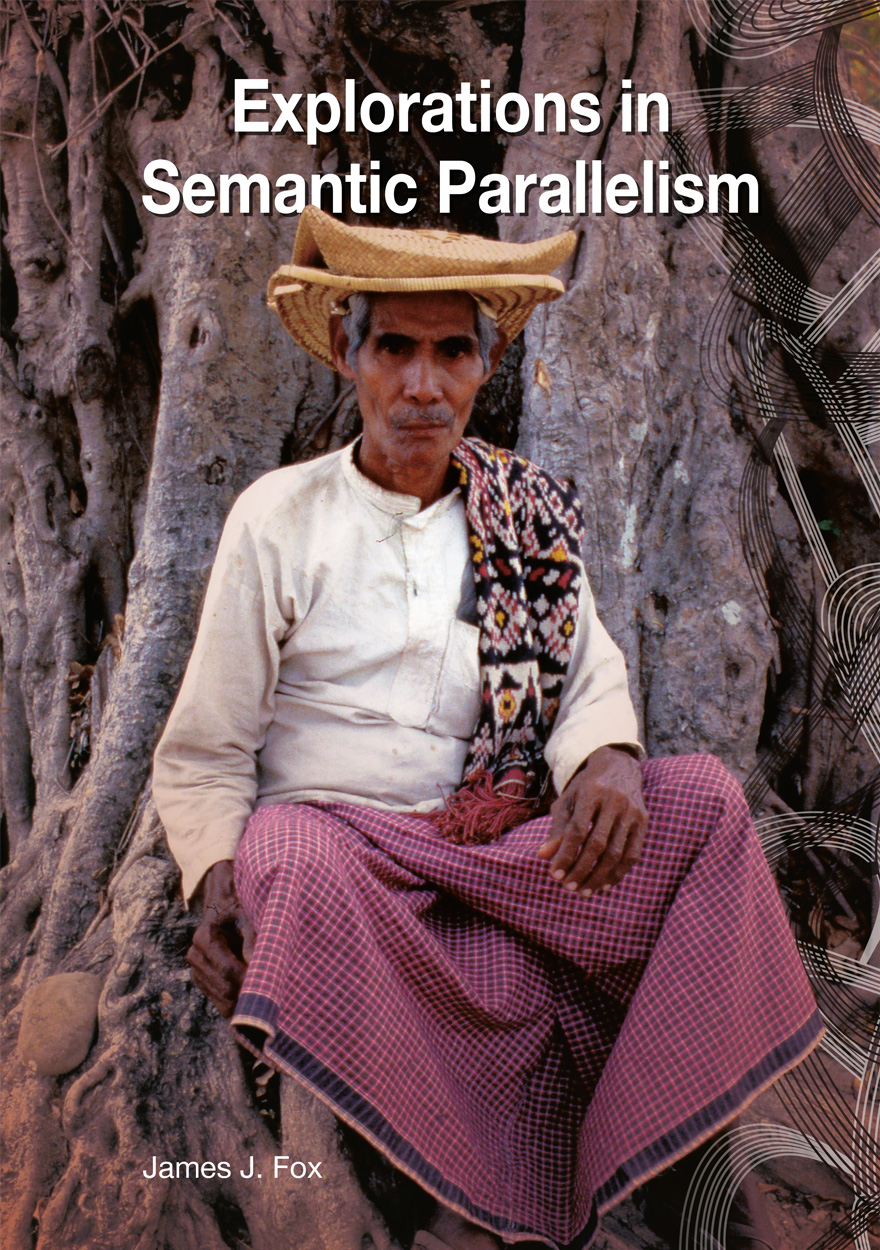
Explorations in Semantic Parallelism »
Authored by: James J. Fox
Publication date: July 2014
This collection of eighteen papers explores issues in the study of semantic parallelism — a world-wide tradition in the composition of oral poetry. It is concerned with both comparative issues and the intensive study of a single living poetic tradition of composition in strict canonical parallelism. The papers in the volume were written at intervals from 1971 to 2014 — a period of over forty years. They are a summation of a career-long research effort that continues to take shape. The concluding essay reflects on possible directions for future research.
Explorations in Semantic Parallelism also offers an enhanced epub: a downloadable ebook format with embedded video. Please download using the link below.
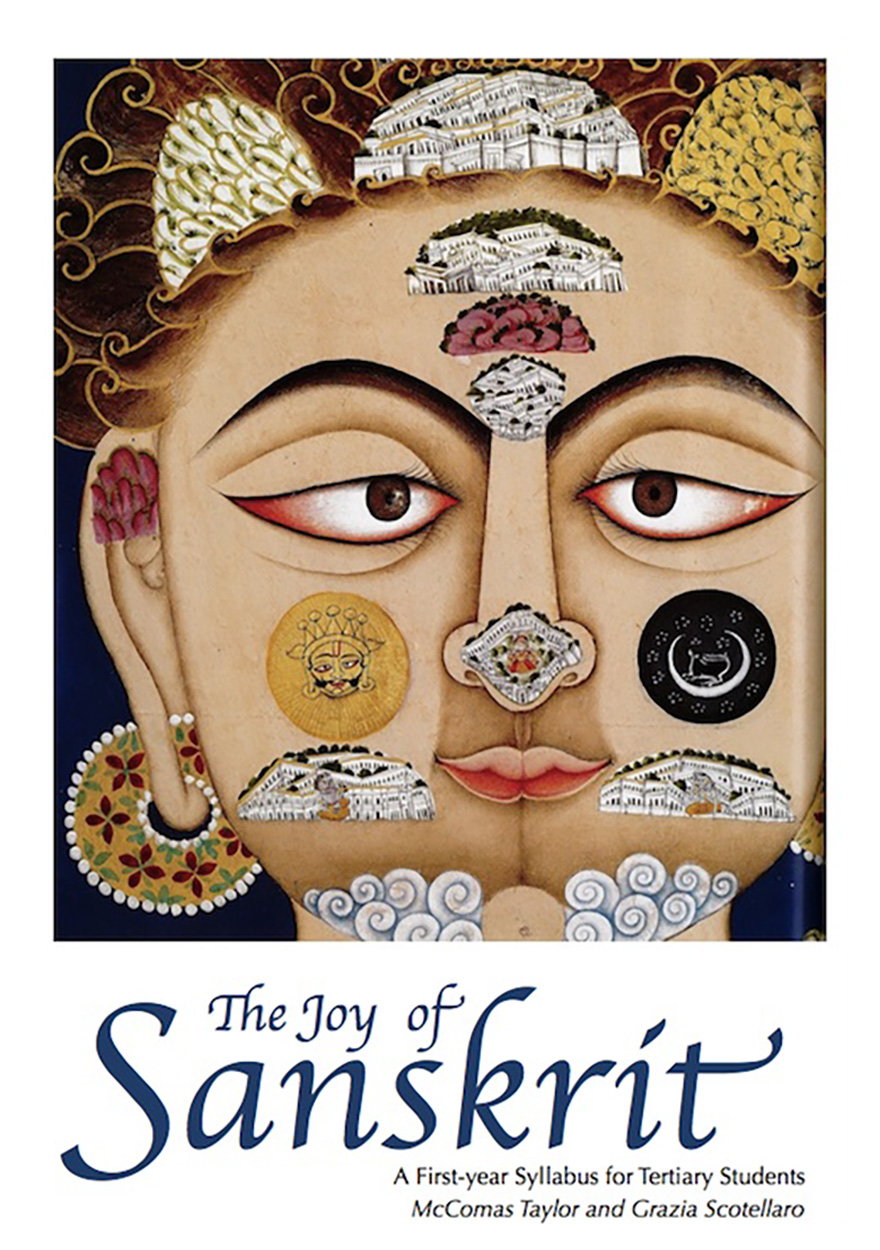
The Joy of Sanskrit »
A first-year syllabus for tertiary students
Authored by: McComas Taylor, Grazia Scotellaro
Publication date: February 2014
The Joy of Sanskrit is a complete first-year course of twenty-five weeks designed for university students. We teach Sanskrit as a living tradition. This is in recognition of the fact that many of our students have backgrounds in Indic religions and Indian cultural practices, including yoga, art, music, dance and song. As a living tradition, we believe that the reception of language (especially the ability to read), should be balanced with its production (writing, speaking, chanting and singing). With this in view, each weekly unit has three parts: 1. simple Sanskrit conversational patterns, 2. a verse from the oral tradition, and 3. the all-important grammar section. The grammar is based on the textbook Introduction to Sanskrit by Prof. Thomas Egenes. Each week includes introductory videos, audio files to help you with correct pronunciation, and an audio commentary on the text book.
By the end of the course, you will be able to conduct a coherent conversation on a range of simple topics, you be able to chant accurately twenty-six well-known verses, and you will have a good grasp of all the most common grammatical forms, so that you are ready to begin reading simple narratives.
In addition to this Joy of Sanskrit e-text, you will need to purchase Introduction to Sanskrit, Parts 1 and 2. (T. Egenes, Motilal Banarsidass, 3rd edition or later), as it contains all the written exercises and solutions.
The Joy of Sanskrit etext is in ePub format, and you will need multimedia-enabled epub reader to access the video and audio content successfully.
If you have an iPad, iPhone or iPod touch, open The Joy of Sanskrit in iBooks
If you have an Android tablet, you will need this app: epubreader
If you have a Mac, Bookreader Lite works very well
If you are running Windows, you can read the ePub with Azardi, available here: http://azardi.infogridpacific.com/azardi-download.html
You can choose to download the complete Joy of Sanskrit e-text or to download each half as separate files.
This textbook is used as course material in:
Sanskrit 1 SKRT1002
Sanskrit 2 SKRT1003
For more information about studying a language at the ANU, please visit the College of Asia and the Pacific Languages website and take a look at the School of Culture, History and Language’s Language Guide (PDF, 2.2 MB).
Download for free
Not available for purchase

Power and Responsibility in Chinese Foreign Policy »
Edited by: Yongjin Zhang, Greg Austin
Publication date: January 2014
The People’s Republic of China is now over fifty years old. Long considered an outsider, or a club of one, in international relations, China has recently become more active in international institutions. Is China becoming a responsible power in global and regional international relations? How accurate is the traditional perception of China? What factors may be motivating the changes in China’s approach to international institutions and its perceptions of its own role in the world? There is no certainty that China is becoming a more responsible power, recent developments may be just another manifestation of realpolitik.
Power and Responsibility in Chinese Foreign Policy provides a vital insight into these issues, analysing the critical issues in China’s international relations– China’s regional and global diplomatic and security problems, the changing role of the People’s Liberation Army, human rights, religious and democratic movements, and the concept of responsibility. Power and Responsibility in Chinese Foreign Policy is an insightful and vital introduction to all sides of the current debate over China’s international relations.

The Aranda's Pepa »
An introduction to Carl Strehlow’s Masterpiece Die Aranda- und Loritja-Stämme in Zentral-Australien (1907-1920)
Authored by: Anna Kenny
Publication date: December 2013
The German missionary Carl Strehlow (1871-1922) had a deep ethnographic interest in Aboriginal Australian cosmology and social life which he documented in his 7 volume work Die Aranda- und Loritja-Stämme in Zentral-Australien that remains unpublished in English. In 1913, Marcel Mauss called his collection of sacred songs and myths, an Australian Rig Veda. This immensely rich corpus, based on a lifetime on the central Australian frontier, is barely known in the English-speaking world and is the last great body of early Australian ethnography that has not yet been built into the world of Australian anthropology and its intellectual history.
The German psychological and hermeneutic traditions of anthropology that developed outside of a British-Australian intellectual world were alternatives to 19th century British scientism. The intellectual roots of early German anthropology reached back to Johann Gottfried Herder (1744-1803), the founder of German historical particularism, who rejected the concept of race as well as the French dogma of the uniform development of civilisation. Instead he recognised unique sets of values transmitted through history and maintained that cultures had to be viewed in terms of their own development and purpose. Thus, humanity was made up of a great diversity of ways of life, language being one of its main manifestations. It is this tradition that led to a concept of cultures in the plural.

Fire Mountains of the Islands »
A History of Volcanic Eruptions and Disaster Management in Papua New Guinea and the Solomon Islands
Authored by: R. Wally Johnson
Publication date: December 2013
Volcanic eruptions have killed thousands of people and damaged homes, villages, infrastructure, subsistence gardens, and hunting and fishing grounds in Papua New Guinea and the Solomon Islands. The central business district of a town was destroyed by a volcanic eruption in the case of Rabaul in 1994. Volcanic disasters litter not only the recent written history of both countries—particularly Papua New Guinea—but are recorded in traditional stories as well. Furthermore, evidence for disastrous volcanic eruptions many times greater than any witnessed in historical times is to be found in the geological record. Volcanic risk is greater today than at any time previously because of larger, mainly sedentary populations on or near volcanoes in both countries. An attempt is made in this book to review what is known about past volcanic eruptions and disasters with a view to determining how best volcanic risk can be reduced today in this tectonically complex and volcanically threatening region.

Tajikistan »
A Political and Social History
Authored by: Kirill Nourzhanov, Christian Bleuer
Publication date: October 2013
This book is a historical study of the Tajiks in Central Asia from the ancient times to the post-Soviet period. For millennia, these descendants of the original Aryan settlers were part of many different empires set up by Greek, Arab, Turkic and Russian invaders, as well as their own, most notably during the Middle Ages. The emergence of the modern state of Tajikistan began after 1917 under Soviet rule, and culminated in the promulgation of independence from the moribund USSR in 1991. In the subsequent civil war that raged between 1992 and 1997, Tajikistan came close to becoming a failed state. The legacy of that internal conflict remains critical to understanding politics in Tajikistan a generation later.
Exploring the patterns of ethnic identity and the exigencies of state formation, the book argues that despite a strong sense of belonging underpinned by shared history, mythology and cultural traits, the Tajiks have not succeeded in forming a consolidated nation. The politics of the Russian colonial administration, the national-territorial delimitation under Stalin, and the Soviet strategy of socio-economic modernisation contributed to the preservation and reification of sub-ethnic cleavages and regional identities. The book demonstrates the impact of region-based elite clans on Tajikistan’s political trajectory in the twilight years of the Soviet era, and identifies objective and subjective factors that led to the civil war. It concludes with a survey of the process of national reconciliation after 1997, and the formal and informal political actors, including Islamist groups, who compete for influence in Tajik society.
“Tajikistan: A Political and Social History is the best source of information on this important country in the English language. Drs Nourzhanov and Bleuer present a comprehensive yet detailed account of the past and prospects of this emerging nation, and have filled one of the major gaps in Central Asian scholarship. This book must be read by those who wish to grasp the vagaries of Central Asia’s evolving political and cultural landscapes.”
— Reuel Hanks, Professor of Geography, Oklahoma State University, and Editor of the Journal of Central Asian Studies.
“If Tajikistan is known outside its region, it is often for the civil war that gravely damaged it. This volume authoritatively provides the longer perspective to the unsettling events of the 1990s and skilfully explains them in terms of history, social structure, and sub-state identities. In addition to highlighting a wealth of local factors, it is insightful on the ways in which antagonists can be transformed into broader ethnic and regional blocs. Kirill Nourzhanov and Christian Bleuer are erudite guides to an understudied part of Central Asia, while astutely instructing us about larger patterns of state-society relations and their impact on the logic of conflict.”
— James Piscatori, Professor of International Relations, Durham University.

Making Change Happen »
Black and White Activists talk to Kevin Cook about Aboriginal, Union and Liberation Politics
Authored by: Kevin Cook, Heather Goodall
Publication date: September 2013
This book is a unique window into a dynamic time in the politics and history of Australia. The two decades from 1970 to the Bicentennial in 1988 saw the emergence of a new landscape in Australian Indigenous politics. There were struggles, triumphs and defeats around land rights, community control of organisations, national coalitions and the international movement for Indigenous rights. The changes of these years generated new roles for Aboriginal people. Leaders had to grapple with demands to be administrators and managers as well as spokespeople and lobbyists. The challenges were personal as well as organisational, with a central one being how to retain personal integrity in the highly politicised atmosphere of the ‘Aboriginal Industry’. Kevin Cook was in the middle of many of these changes – as a unionist, educator, land rights campaigner, cultural activist and advocate for liberation movements in Southern Africa, the Pacific and around the world. But ‘Cookie’ has not wanted to tell the story of his own life in these pages. Instead, with Heather Goodall, a long time friend, he has gathered together many of the activists with whom he worked to tell their stories of this important time. Readers are invited into the frank and vivid conversations Cookie had with forty-five black and white activists about what they wanted to achieve, the plans they made, and the risks they took to make change happen.
“You never doubted Kevin Cook. His very presence made you confident because the guiding hand is always there. Equal attention is given to all. I am one of many who worked with Cookie and Judy through the Tranby days and in particular the 1988 Bicentennial March for Freedom, Justice and Hope. What days they were. I’m glad this story is being told.”
— Linda Burney, MLA New South Wales
“Kevin Cook was a giant in the post-war struggle for Aboriginal rights. His ability to connect the dots and make things happen was important in both the political and cultural resurgence of the 1970s onwards.”
— Meredith Burgmann, former MLC, New South Wales
“Kevin has had a transformative effect on the direction of my life and the lives of so many other people. This book is an important contribution to understanding not only Kevin’s life but also the broader struggles for social and economic justice, for community empowerment and of the cooperative progressive movement. It will greatly assist the ongoing campaign for full and sustainable reconciliation.”
— Paddy Crumlin, National Secretary, Maritime Union of Australia
“Cookie has made great contributions in enhancing the struggles of our people. He is a motivator, an astute strategist, and an excellent communicator with wonderful people skills. It’s a pleasure to be able to call him a mate and a brother.”
— John Ah Kit, former MLA, Northern Territory
For more information on Aboriginal History Inc. please visit aboriginalhistory.org.au.
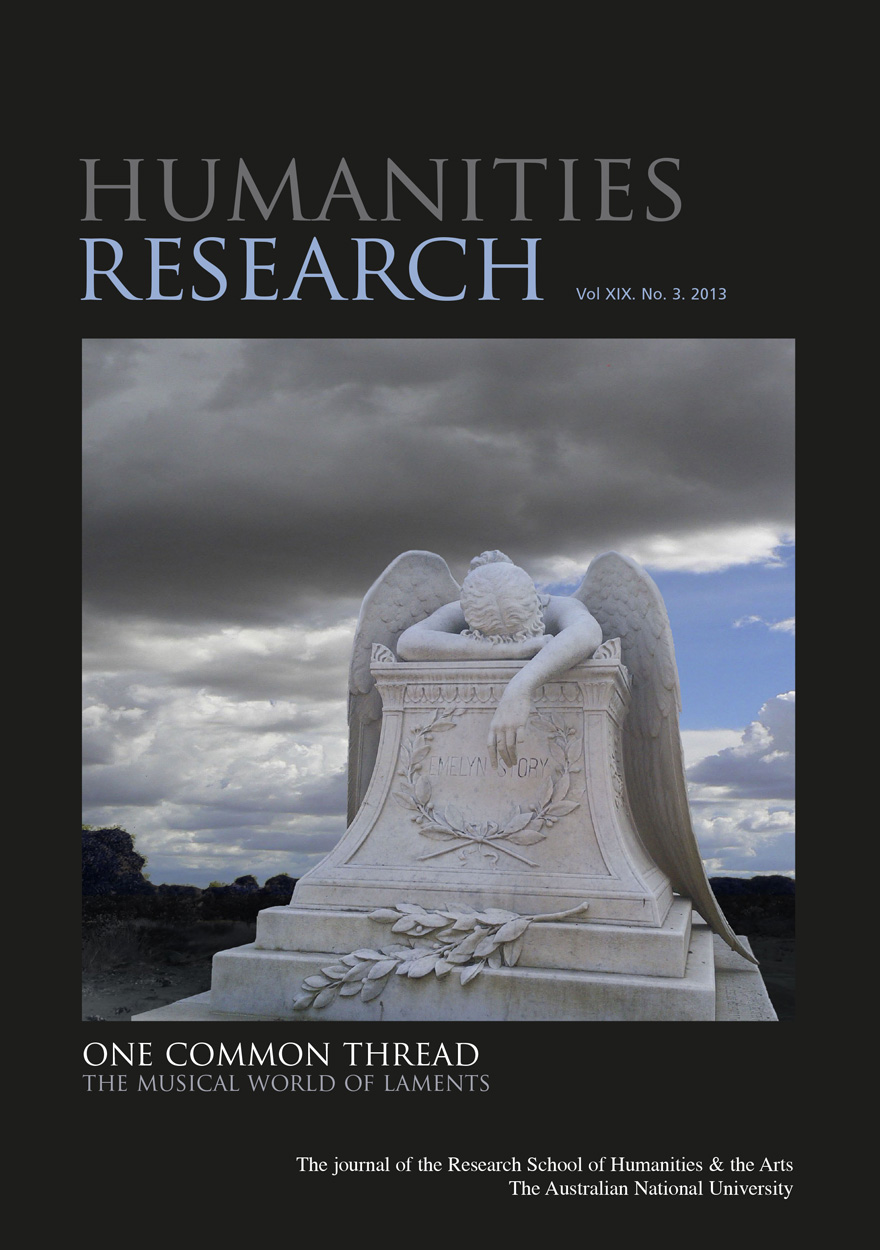
Humanities Research: Volume XIX No. 3. 2013 »
One Common Thread: The Musical World of Lament
Edited by: Aaron Corn, Ruth Lee Martin, Di Roy, Stephen Wild
Publication date: September 2013
Humanities Research is an internationally peer-reviewed journal published by the Research School of Humanities at The Australian National University. The Research School of Humanities came into existence in January 2007 and consists of the Humanities Research Centre, Centre for Cross-Cultural Research, National Europe Centre and Australian National Dictionary Centre. Launched in 1997, issues are thematic with guest editors and address important and timely topics across all branches of the humanities.
Download for free
Not available for purchase
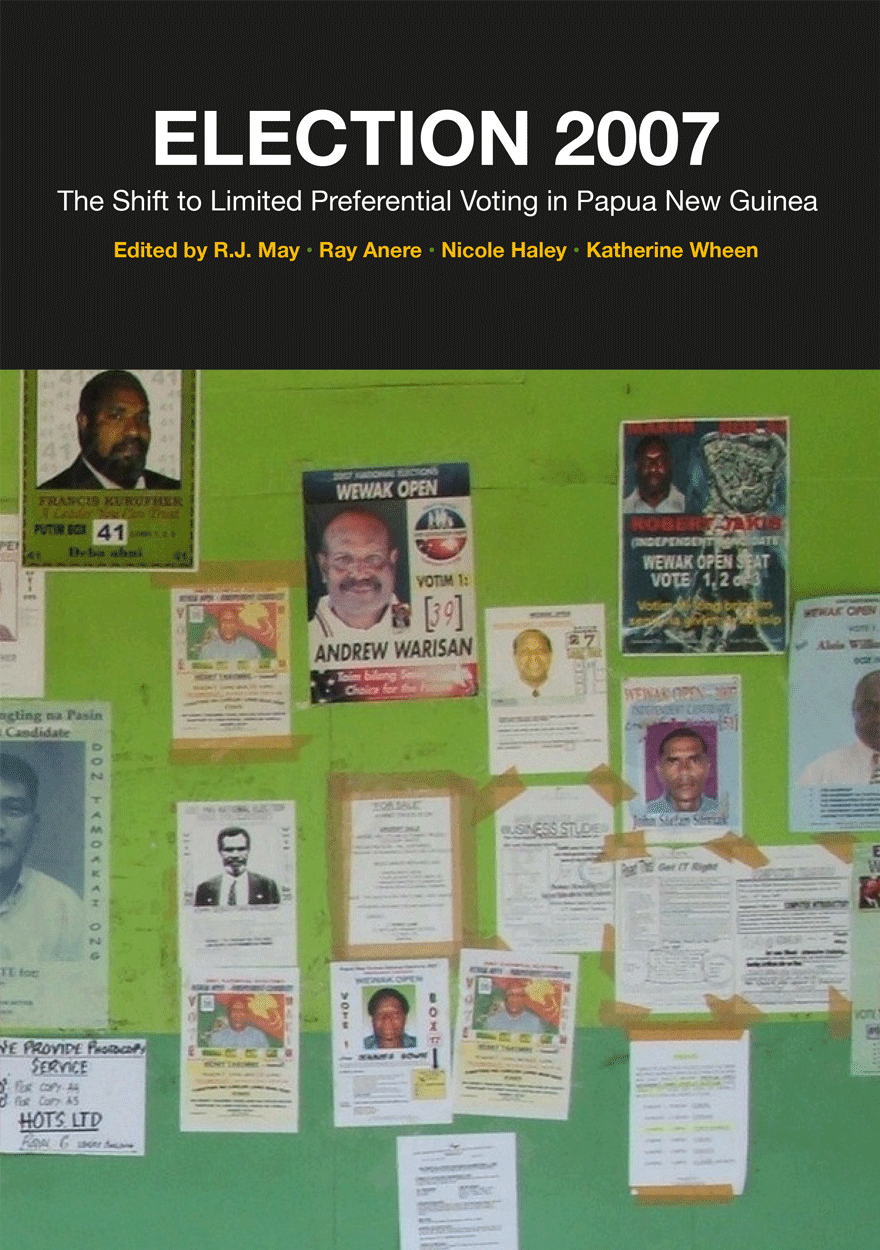
Election 2007 »
The Shift to Limited Preferential Voting in Papua New Guinea
Edited by: R.J. May, Ray Anere, Nicole Haley, Katherine Wheen
Publication date: September 2013
Papua New Guinea’s general election in 2007 attracted particular interest for several reasons. Not only did it follow what was widely acknowledged as the country’s worst election ever, in 2002 (in which elections in six of the country’s 109 electorates were declared to be ‘failed elections’), it was the first general election to be held under a new limited preferential voting system. It also followed the first full parliamentary term under the Organic Law on the Integrity of Political Parties and Candidates, which had been introduced in 2001 in an attempt to strengthen political parties and create a greater degree of stability in the national parliament, and was the first to embrace a ‘whole-of-government’ approach to electoral administration, through an Interdepartmental Electoral Committee. This volume provides an analysis of the 2007 election, drawing on the work of a domestic monitoring team organized through the National Research Institute, and several visiting scholars. It addresses key issues such as voter education, electoral administration, election security, the role of political parties, women as candidates and voters, the shift to limited preferential voting, and HIV transmission, and provides detailed accounts of the election in a number of open and provincial electorates. It is generally agreed that the election of 2007 was an improvement on that of 2002. But problems of electoral administration and voting behaviour remain. These are identified in this volume, and recommendations made for electoral reform.
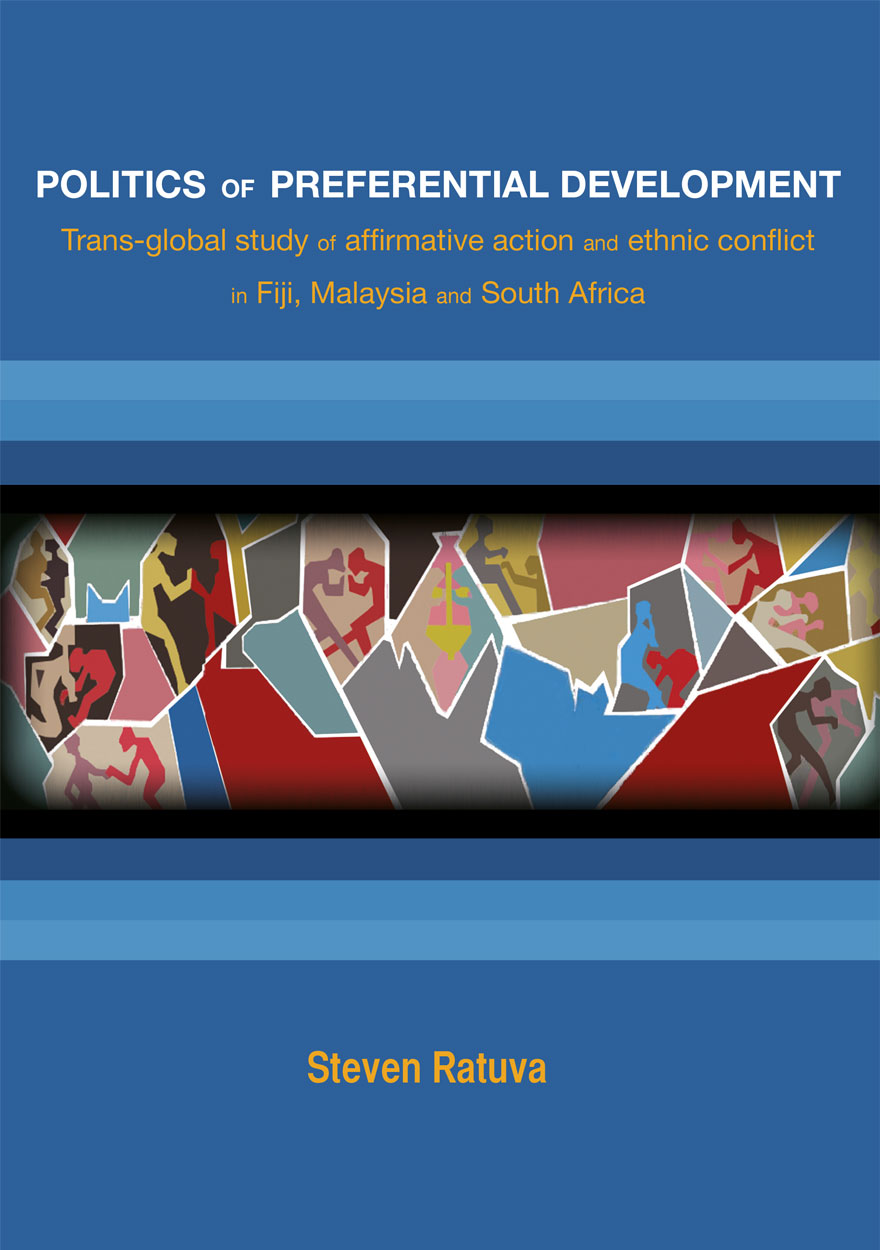
Politics of preferential development »
Trans-global study of affirmative action and ethnic conflict in Fiji, Malaysia and South Africa
Authored by: Steven Ratuva
Publication date: July 2013
The book is a critical examination of affirmative action, a form of preferential development often used to address the situation of disadvantaged groups. It uses a trans-global approach, as opposed to the comparative approach, to examine the relationship between affirmative action, ethnic conflict and the role of the state in Fiji, Malaysia and South Africa. While affirmative action has noble goals, there are often intervening political and ideological factors in the form of ethno-nationalism and elite interests, amongst others, which potentially undermine fair distribution of affirmative action resources. The book examines the affirmative action philosophies and programs of the three countries and raises pertinent questions about whether affirmative action has led to equality, social justice, harmony and political stability and explores future possibilities.
Steven Ratuva provides a brilliant critical study, not just of affirmative action policy and practice in three very different postcolonial contexts, but of the very complex matters of principle, justification and ideology that are involved more generally. It is an invaluable contribution to the literature on this important topic.
— Dr Stephanie Lawson, Professor of Politics and International Relations, Macquarie University.
Scholarly and provocative, Steven Ratuva’s Politics of Preferential Development is an original and insightful comparative contribution to the growing literature on affirmative action around the world.
— Dr Ralph Premdas, Professor of Public Policy, University of West Indies; Former Professor, University of California Berkeley and University of Toronto.



